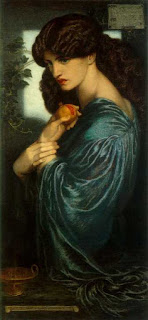Innocence to Experience
Lately I have been experimenting with developing a self-portrait poem based of the Greek myth cycle-tragedy concerning Persephone—at the risk of seeming to appropriate and exploit the female-based traumatic experience. It remains difficult outlining the possibilities—the approach I have been considering centers around the ramifications of her abduction and the side emotions of possibly feeling abandoned by her mother, Demeter.
Proserpine Dante Gabriel Rossetti, 1874, Tate Britian
Near the close of the cycle of stories, she is in Hades, after a series of months—there is a moment in an Underworld garden she “accidentally” swallows pomegranate seeds, presumably because of hunger. Yet a twist on the usual story could show she intentionally takes the food as sudden resolve to remain in the Afterlife, an act of giving up because her mother apparently has abandoned her.
The poem would work within a self reflection of the bitterness Persephone feels. Anger at the lack of connection, community, lack of family. This is the moment she shifts from innocent child victim to experienced embittered woman. It would attempt to explain how she became an Ancient world goddess for witches, for magic and folktale crones.
A sympathy poem told in first person.
• As a result, I am lost in another night of insomnia. Oddly placed on a Monday night, not the usual pattern of days. First, I feel the beginnings of drowsiness until a vague small sound falls—or an itch forms along the curve of my leg, pulling me back into a tight state of wakefulness.
In the past, a visual concentration on an object, random and mundane, would help sink the consciousness into a healthy limbo: but tonight the mind wanders, scattered ideas arrive unbidden—as if a large mug of coffee was consumed moments ago.
The body pulses with awkward awareness.
Proserpine Dante Gabriel Rossetti, 1874, Tate Britian
The idea came to fruition from a short series of fractured lines in the ongoing River project:
1418. Bitter as Persephone, digging into the fruit of ripe pomegranates, believing the world had given up on her.
1419. Bitter at her mother for forgetting her, as she believed she was abandoned to the fate of the Underworld.
1420. Bitter-sweet as the seeds themselves, soft on the tongue.
1421. The fruit fresh from the Underworld gardens.
1422. Where witches tend the wilding orchard of dark figs, blood mangoes, blue shadowy berries.
Near the close of the cycle of stories, she is in Hades, after a series of months—there is a moment in an Underworld garden she “accidentally” swallows pomegranate seeds, presumably because of hunger. Yet a twist on the usual story could show she intentionally takes the food as sudden resolve to remain in the Afterlife, an act of giving up because her mother apparently has abandoned her.
The poem would work within a self reflection of the bitterness Persephone feels. Anger at the lack of connection, community, lack of family. This is the moment she shifts from innocent child victim to experienced embittered woman. It would attempt to explain how she became an Ancient world goddess for witches, for magic and folktale crones.
A sympathy poem told in first person.
In the past, a visual concentration on an object, random and mundane, would help sink the consciousness into a healthy limbo: but tonight the mind wanders, scattered ideas arrive unbidden—as if a large mug of coffee was consumed moments ago.
The body pulses with awkward awareness.


I've been tortured by the same insomnia - especially that 'itch along the curve of my leg' type of insomnia.
ReplyDeleteIt always happens when my mind is racing - when there is a lot of thinking work to be done. When I know there is something taking shape in the darkness - it's as if I need to be awake to realise when it's happened.
I can understand the hesitation in appropriation. But it's your sensitivity to that which will make this work. I get tired sometimes of the gendered-ness of everything. Sometimes I just want to escape that - to be simply, unadornedly human. Wouldn't that be astonishing. To be without gender - free from all the definitions/restraints/restrictions that being one thing or the other entails. I could write for ever on this subject - it seems my whole life has been a battle against it all. And not one I've won.
Just one thing (it's a long time since I read any Greek mythology) - I thought it was her father who betrayed/abandoned her to her fate with his brother Hades? And her mother Demeter who forced her return for 6 mons of the year?
—oh yes. It was Zeus who played judge over the situation. What I meant to show was a twist on the details—what f Persephone for a minute thought the world/Demeter had given up on her.
DeleteOne of the secondary (lesser discussed) stories about her show a progression to a disillusioned woman, no longer the little girl collecting flowers.
It is Shakespeare (I think) who used her as an pagan image for witchcraft... need to double check my anthologies.